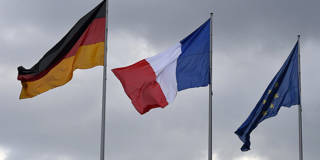Europe’s New Hope?
The prospect that the centrist, pro-European Emmanuel Macron will be the next French president has fueled hope that renewed Franco-German leadership of the EU may be on the horizon. After Germany's general election in September, however, both countries may have to focus on sorting out Italy's weaknesses and priorities.

BRUSSELS – The prospect that the centrist, pro-European Emmanuel Macron will become the next French president has fueled hope that renewed Franco-German leadership of the European Union may be on the horizon. After Germany’s general election in September, it is hoped, a more stable EU could begin to make much faster progress toward unity and integration.